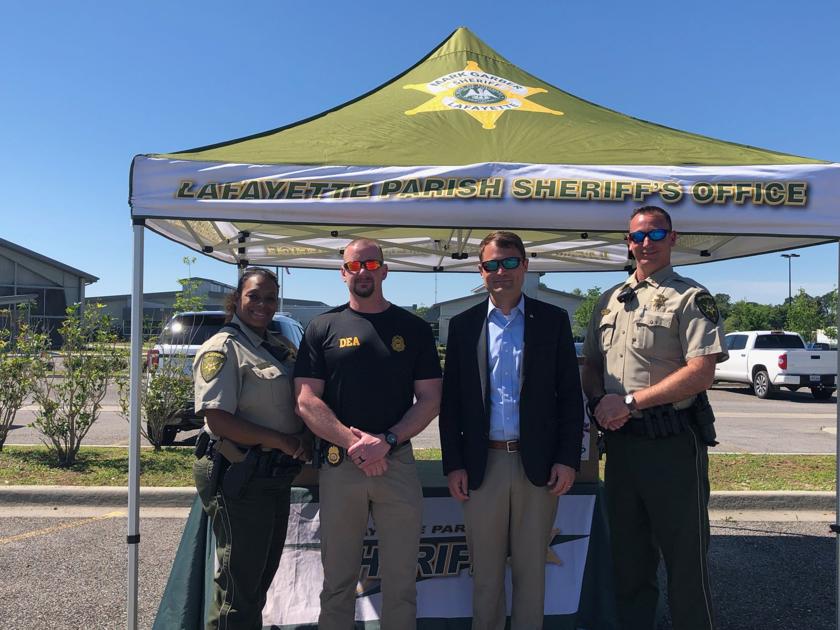
28 Apr Law enforcement works to ‘dry up supply’ of loose prescription drugs with take back day | Crime/Police
The goal is to limit future drug abuse, the Lafayette Parish Sheriff’s Office participated in the Drug Enforcement Administration’s 17th nationwide prescription drug take back day Saturday, collecting unused prescription drugs from the community to safely dispose them.
In October, 3,615 pounds of prescription drugs were collected in Louisiana during the last take back day, according to a DEA news release.
The drop-off process is anonymous and people disposing of prescriptions don’t have to answer for scratched off bottles or prescriptions under different names. The goal is to encourage people to clear out their medicine cabinets and to reduce the stigma of handing over prescription drugs to law enforcement, said DEA agent Scott Wright, the group supervisor for the DEA’s Lafayette and Lake Charles offices.
“Whatever we can do to help eliminate the pills from hitting the streets and destroying other lives, we’re willing to do it,” Wright said. “It’s like in other big cities where they have ‘Turn Your Gun In’ days. It’s just about getting another weapon off the streets. These pills, they can be weapons.”
He said between 6 million and 10 million people abused prescription drugs last year. Overdoses involving opioids killed more than 47,000 people nationwide in 2017, and 36 percent of those deaths involved prescription opioids, according to data from the Centers for Disease Control and Prevention.
For many, the addiction starts when they’re prescribed opioids after a car accident or workplace injury and then are unable to wean themselves off the drugs, Wright said. Abusers then get access to pills by rooting through the medicine cabinets of friends, family members and acquaintances.
U.S. Attorney for the Western District of Louisiana David C. Joseph was also at the collection site and said take back days are one facet of law enforcement’s fight against the opioid epidemic.
Joseph said agents are working to stem the trafficking of fentanyl and heroin along major interstates and highways, limit prescription diversion or overprescribing by doctors, and collect unused drugs in the community to “dry up the supply.” He said his office is also working to try more opioid-related cases.
The challenge of the opioid epidemic is the large swath of the country it impacts and how the drugs are getting into people’s hands, Joseph said. Opioid addiction hits every segment of society, races, ages and income groups, and most people’s addiction begins through interactions with legally prescribed medications.
“It’s a 65-year-old lady that’s been hooked on pain pills since she had her surgery 13 years ago and now her doctor is tightening up on her prescription so she’s looking for illegal sources because she’s addicted,” Joseph said.
Authorities are still working to grasp the full picture of overdose deaths and drug abuse in southwestern Louisiana, he said.
“If it’s not here already it’s not long before it gets here,” Joseph said.
The National Institute on Drug Abuse reported 415 people died of opioid-related overdoses statewide in 2017. Large increases were seen in the number of deaths involving fentanyl and heroin, the report said.
Wright said it’s increasingly common for drug dealers to manufacture their own pills to mimic popular prescriptions like OxyContin, then fill the capsules with fentanyl or a combination of fentanyl and heroin. Most overdoses in the 16 parishes he oversees involve a combination of prescription drugs and other drugs, or fentanyl-laced heroin, he said.
Lafayette-area residents don’t have to wait until the next DEA take back day to turn over their unused prescriptions. Sheriff Mark Garber said the department has a permanent drop box at the Lafayette Sheriff’s Office headquarters on Main Street, and residents can drop their prescriptions in the secure box at any time.
Other Acadiana-area permanent drop locations are available at the sheriff’s offices in Acadia, St. Landry, St. Mary and Vermilion parishes, according to state Attorney General Jeff Landry’s website End the Epidemic Louisiana.
The box for the St. Mary Sheriff’s Office is located at the department’s branch office in Morgan City, the website says.
Follow Katie Gagliano on Twitter, @katie_gagliano.
[ad_2]
Source link



No Comments